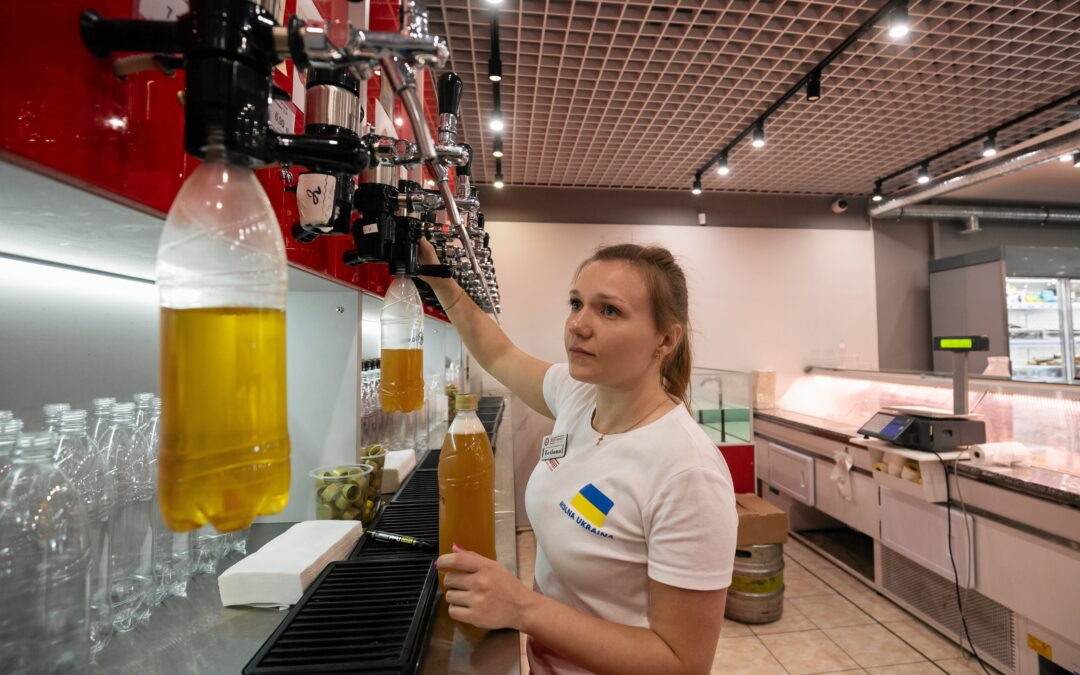Keep our news free from ads and paywalls by making a donation to support our work!

Notes from Poland is run by a small editorial team and is published by an independent, non-profit foundation that is funded through donations from our readers. We cannot do what we do without your support.
Ukrainian refugees boosted the size of Poland’s economy by 2.7% last year while not increasing unemployment or pushing down wages, according to a report by the UN refugee agency (UNHCR) and accounting firm Deloitte.
“Whoever thinks refugees are a burden on the economy should think again,” said Kevin J. Allen, the UNHCR’s representative in Poland. “This proves that smart humanitarian and economic policies can go hand in hand.”
"Kto myślał, że uchodźcy z 🇺🇦 obciążają gospodarkę, niech pomyśli jeszcze raz. Pozwalając im podjąć pracę i założyć biznes, Polska zwiększyła swój PKB o – bagatela – 2,7 procent w 2024”, mówi Kevin Allen, Przedstawiciel UNHCR w 🇵🇱.
🫴https://t.co/fz8hdqYrjj pic.twitter.com/AFlrfa8Xsl
— UNHCR Polska (@UNHCRPoland) June 10, 2025
In 2022, Poland became the primary destination for refugees fleeing Russia’s full-scale invasion of Ukraine. The new study found that “Poland’s swift opening of its labour market enabled refugees to integrate economically and support themselves primarily through work”.
Modelling carried out by Deloitte showed that the presence of Ukrainian refugees raised Poland’s real gross domestic product (GDP) by 1.5% in 2022, 2.3% in 2023 and 2.7% in 2024 – equivalent to an additional 98.7 billion zloty (€23.1 billion) in output last year.
“This is the amount that would be lost, should refugees ‘disappear’ from the Polish economy,” the study notes. The gains are primarily driven by the increased number of workers entering the labour market, but they also reflect productivity improvements stemming from a larger pool of talent.
Raport Deloitte (TEP: @JPatorska @A_Laszek @ratrzeci) nie znajduje negatywnego wpływu konkurencji ze strony ukraińskich uchodźców na rynek pracy, co wykorzystuje do kalibracji modelu CGE – efekt pracy uchodźców i dostosowań polskiej gospodarki to 2,7% PKB: https://t.co/sbUdrx2Q9D pic.twitter.com/iEA1LwNoSS
— Towarzystwo Ekonomistów Polskich (TEP) (@TEP_association) June 10, 2025
The model originally sought to account for the possibility of negative labour market effects, such as downward pressure on wages and higher unemployment among Polish workers. However, these did not materialise. “Instead, Polish workers have moved on to better-paid occupations,” the report found.
Poland has recently recorded some of the lowest unemployment rates in its history, which at the beginning of this year were also the lowest in the European Union. Last year also saw wages in Poland growing at the fastest rate in decades.
The new report found that 69% of working-age Ukrainian refugees are now employed, not much below the employment rate for Polish citizens (75%).
But significant barriers remain. Refugees are only half as likely as Polish citizens to hold formal job contracts and are underrepresented in high-income roles. While 40% of refugees hold university degrees – above the Polish average of 38% – only 12% work in roles typically requiring higher education, compared to 37% of Poles.
This mismatch is reflected in wages. Refugees with higher education earn only 22% more than those without, compared to an 84% wage premium among Polish citizens.
Language skills also strongly influence income: refugees fluent in Polish earn around 700 zloty net more per month than those with limited proficiency.
“While many refugees have quickly integrated, vulnerable groups still require targeted assistance,” Deloitte and UNHCR noted in a statement. “Sustained economic inclusion is essential for long-term stability and growth.”
Ukrainian immigrants pay more in taxes than they receive in benefits, a report by Poland's National Development Bank has concluded.
The research also indicated that Ukrainians contribute between 0.5% and 2.4% to Poland's annual GDP growth https://t.co/KhXxLtif5W
— Notes from Poland 🇵🇱 (@notesfrompoland) March 15, 2025
Their report’s findings follow recent research by Poland’s National Development Bank (BGK), which found that Ukrainians contribute more in taxes than they receive in benefits. The state Social Insurance Institution (ZUS) has also found that Poland needs to attract up to two million migrants to maintain its working-age population.
Nevertheless, the large-scale immigration Poland has received in recent years – most of which has come from Ukraine – has also prompted a political backlash.
During the recent presidential election campaign, far-right Confederation (Konfederacja) candidate Sławomir Mentzen claimed – without evidence – that Ukrainians “cost more than they pay in taxes”.
Karol Nawrocki of the opposition Law and Justice (PiS) party, who ultimately won the election, called for a new law ensuring that Poles have priority access to services such as healthcare and education ahead of immigrants.
Conservative presidential candidate @NawrockiKn has pledged to submit a bill guaranteeing that “Poles cannot be treated worse in their own country than immigrants”.
He wants Polish citizens to be given priority over immigrants in healthcare and education https://t.co/9514SiM5Xe
— Notes from Poland 🇵🇱 (@notesfrompoland) April 9, 2025

Notes from Poland is run by a small editorial team and published by an independent, non-profit foundation that is funded through donations from our readers. We cannot do what we do without your support.
Main image credit: Sylwia Penc / Agencja Wyborcza.pl

Alicja Ptak is deputy editor-in-chief of Notes from Poland and a multimedia journalist. She has written for Clean Energy Wire and The Times, and she hosts her own podcast, The Warsaw Wire, on Poland’s economy and energy sector. She previously worked for Reuters.



















